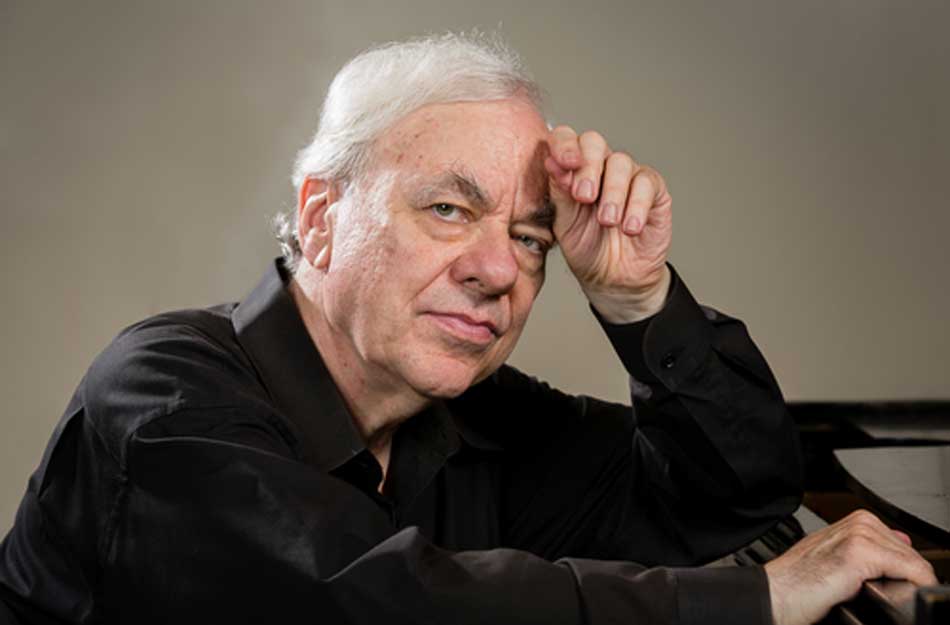St. Luke’s Cathedral – 143 State Street, Portland, ME
Sponsored by Eric and Jenny Yao

“It is virtually impossible to walk away from one of Mr. Goode’s recitals without the sense of having gained some new insight, subtle or otherwise, into the works he played or about pianism itself.”
— The New York Times
Pianist Richard Goode has been hailed for music-making of tremendous emotional power, depth, and ex-pressiveness, and has been acknowledged worldwide as one of today’s leading interpreters of Classical and Ro-mantic music. In regular performances with the major orchestras, recitals in the world’s music capitals, master-classes in person or online, and through his extensive and acclaimed Nonesuch recordings, he has won a large and devoted following.
An exclusive Nonesuch recording artist, Goode has made more than two dozen recordings over the years, rang-ing from solo and chamber works to lieder and concertos. His 10-CD set of the complete Beethoven sonatas cy-cle, the first-ever by an American-born pianist, was nominated for a Grammy and has been ranked among the most distinguished recordings of this repertoire. Other recording highlights include numerous Mozart piano con-certi with Orpheus and the Beethoven piano concerti with Ivan Fischer and Budapest Festival Orchestra.
A native of New York, Richard Goode studied at the Mannes College of Music and the Curtis Institute. His numer-ous prizes over the years include the Young Concert Artists Award, First Prize in the Clara Haskil Competition, the Avery Fisher Prize, and a Grammy award for the Brahms Sonatas recorded with clarinetist Richard Stoltzman.
Mr. Goode served as co-Artistic Director of the renowned Marlboro Music School and Festival in Vermont from 1999 through 2013. In Fall 2021, Mr. Goode joined the Peabody Conservatory as Distinguished Artist Faculty.
Six Bagatelles from Op. 119, nos. 6-11 (1822)
6. Andante – Allegretto
7. Allegro, ma non troppo
8. Moderato cantabile
9. Vivace moderato
10. Allegramente
11. Andante ma non troppo
Piano Sonata No. 30 in E Major, Op. 109 (1820)
Vivace ma non troppo, sempre legato – Adagio espressivo
Prestissimo
Gesangvoll, mit innigster Empfindung. Andante molto cantabile ed espressivo
— Intermission —
33 Variations on a Waltz by Diabelli, Op. 120 (1824)
Theme: Vivace
Variation 1 Alla marcia maestoso
Variation 2 Poco allegro
Variation 3 L’istesso tempo
Variation 4 Un poco più vivace
Variation 5 Allegro vivace
Variation 6 Allegro ma non troppo e serioso
Variation 7 Un poco più allegro
Variation 8 Poco vivace
Variation 9 Allegro pesante e risoluto
Variation 10 Presto
Variation 11 Allegretto
Variation 12 Un poco più moto
Variation 13 Vivace
Variation 14 Grave e maestoso
Variation 15 Presto scherzando
Variation 16 Allegro
Variation 17 Allegro
Variation 18 Poco moderato
Variation 19 Presto
Variation 20 Andante
Variation 21 Allegro con brio – Meno allegro
Variation 22 Allegro molto, alla ‘Notte e giorno faticar’ di Mozart
Variation 23 Allegro assai
Variation 24 Fughetta. Andante
Variation 25 Allegro
Variation 26 Piacevole
Variation 27 Vivace
Variation 28 Allegro
Variation 29 Adagio ma non troppo
Variation 30 Andante, sempre cantabile
Variation 31 Largo, molto espressivo
Variation 32 Fugue. Allegro
Variation 33 Tempo di Minuet moderato
